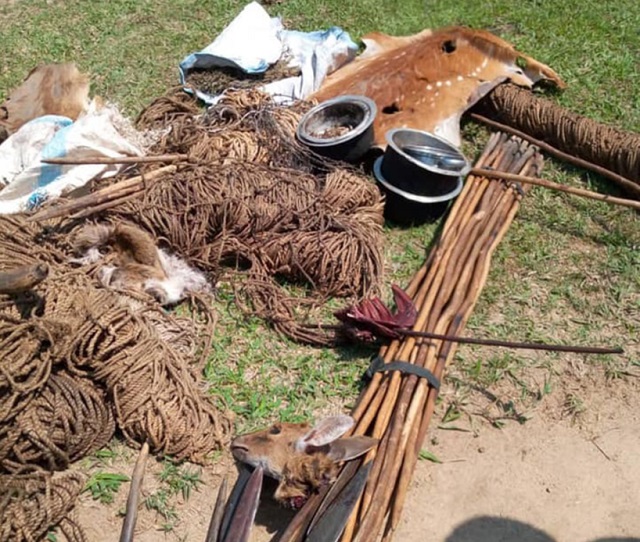
Park communities join organised criminals for survival as absence of tourist dollars spreads poverty
Kampala, Uganda | RONALD MUSOKE | Poaching in Uganda’s national parks has doubled during the COVID-19 pandemic compared to the same period last year, say officials at the Uganda Wildlife Authority (UWA), the national conservation agency.
UWA recorded 367 poaching cases across the country between February and June this year, more than the 163 cases the agency recorded during a similar period in 2019.
The tourism industry is Uganda’s leading foreign exchange earner raking in over US$ 1.5bn or about 9% of the country’s GDP. The sector also directly employs about 670,000 Ugandans.
Tourist expeditions bring in a large portion of Uganda’s tourism dollars—directly supporting jobs for hoteliers, porters, cooks, cleaners and travel agencies and drivers of tourist vehicles.
Before the pandemic, the permit foreign visitors had to buy to observe gorillas with a guide cost US$ 600 (Shs2.25 million).
“Given the loss of revenues and income from tourism, as well as overall economic hardship caused by strict lockdown measures, it is not surprising if illegal activities have increased in the past months.”
“People are trying to survive,” Martha Robbins, a National Geographic Society researcher on Africa’s mountain gorillas told National Geographic recently.
President Yoweri Museveni announced a lockdown of the country; including a ban on international travel, in the last week of March. Since then, Samuel Mwanda, the executive director of UWA says, tourist visits to the national parks and reserves have dropped to zero from a monthly average of 25,000 visitors, disrupting revenue generation, local economies and employment.
“The loss of community benefits/revenue sharing has led to an upshoot in poaching and other illegal activities,” he says.
The four straight months of COVID-19-inspired tourism inactivity in national parks and wildlife reserves appear to have given opportunity for poachers to wreak havoc on the country’s wildlife, including some which are endangered species.
Without tourists, UWA officials say, it has been easier for poachers to monitor the surveillance activity of game rangers.
Mwanda was part of a virtual meeting organised on June 23 by the Earth Journalism Network, the East African Community, USAID and the International Union for Conservation of Nature (IUCN) about the impact of COVID-19 on wildlife conservation in East Africa.
He said poaching has increased because many people ran away from towns and went back to their villages and many of them have nothing to do.
“These are the people who are resorting to poaching. Even porters and guides who live around the protected areas have also been redundant since COVID-19 started and are also now poaching.”
Conservation managers at UWA believe thousands of poaching gear has been hidden within Uganda’s national parks since the coronavirus lockdown began in late March. On a recent reconnaissance in June, UWA rangers alongside its partners from the Uganda Conservation Foundation found traps with seven dead giraffes in them.
“We found five in one day and two in the next, all in one area,” Charles Tumwesigye, UWA’s deputy director of field operations told National Geographic.
In mid-June, the conservation world was enraged when UWA rangers found one of the most popular Mountain Gorillas in Bwindi Impenetrable Forest National Park dead in Southwestern Uganda.
The 25-year old silverback known as Rafiki was apparently killed by poachers who were on a hunting spree inside the national park’s Nkuringo area which is found in the southern sector of the park.
Conservationists say Rafiki had led one of several habituated groups in the park for close to ten years attracting thousands of tourists from around the world.
Many visitors who had the privilege to encounter Rafiki described him as a gentle giant who protected his family of 17. The poachers had gone to the park to hunt bush pig according to a statement released by UWA on June 12.
The Nkuringo group was the first to be habituated in the southern sector of Bwindi, effectively opening up, the area for mountain gorilla tourism. Bwindi Impenetrable Forest National Park and Mgahinga National Park have 18 gorilla groups with eight tourists visiting each group per day. The two parks are visited by about 40,000 tourists every year.
 The Independent Uganda: You get the Truth we Pay the Price
The Independent Uganda: You get the Truth we Pay the Price


